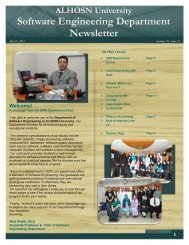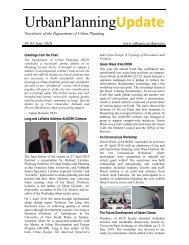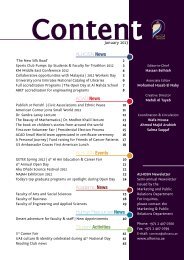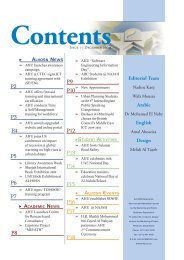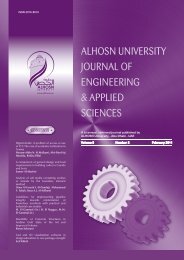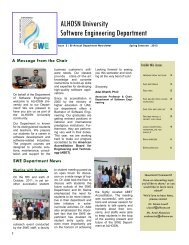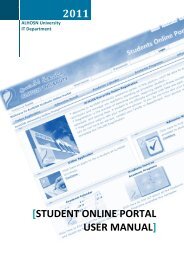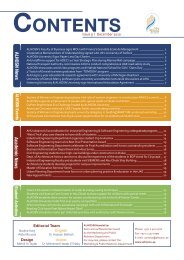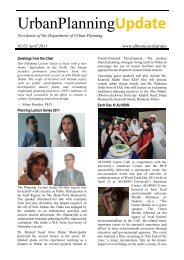ALHOSN University Catalogue Global Knowledge with Local Vision ...
ALHOSN University Catalogue Global Knowledge with Local Vision ...
ALHOSN University Catalogue Global Knowledge with Local Vision ...
You also want an ePaper? Increase the reach of your titles
YUMPU automatically turns print PDFs into web optimized ePapers that Google loves.
Department of Civil Engineering<br />
What is Civil Engineering?<br />
This discipline deals <strong>with</strong> a vast number of applications, ranging from buildings, airports, and bridges to<br />
water treatment plants, pipelines and space-age materials. The oldest known engineering work relates to<br />
civil engineering activities is the construction of pyramids some 2500 BC. In the post- industrial<br />
revolution era, civil engineering involved all physical structures, including those related to energy,<br />
production, natural resource development, environmental issues, transportation, and others. In the<br />
information age, civil engineering includes space-age material development, bioengineering, and smart<br />
transportation systems.<br />
Bachelor of Science in Civil Engineering (BSCE)<br />
Overview<br />
The Bachelor of Science in Civil Engineering (BSCE) is designed to prepare students for a successful<br />
career in civil engineering industry, particularly the sector dealing <strong>with</strong> infrastructures construction<br />
and maintenance in the civil sector. Students are exposed to a wide range of theories and practices of<br />
civil engineering through a series of dynamic curricula.<br />
Mission<br />
The mission of the Civil Engineering Program at <strong>ALHOSN</strong> <strong>University</strong> is to provide engineering<br />
students the ability to design and construct physical infrastructures as related to civil, energy,<br />
environment, and communication activities in our society. This mission is carried out through a set of<br />
objectives and goals which describe the expected accomplishments of the program and include<br />
adopted methods to provide students <strong>with</strong> the required knowledge in applied theory and practice to<br />
prepare them for the present and future demands and challenges of the civil engineering profession.<br />
BSCE Program Goals<br />
1. Equip the students <strong>with</strong> comprehensive education during their first two years in physical<br />
sciences, mathematics, engineering sciences, and design.<br />
2. Widen the students' knowledge by exposing them to complementary studies in the<br />
<strong>University</strong> General Requirement (UGR) Program.<br />
3. Provide the students <strong>with</strong> specialized courses in Civil Engineering in their third and fourth<br />
year through a rigorous curriculum of core courses and technical electives.<br />
4. Encourage the students to become self-learners to be ready for a life-long learning experience<br />
by engaging them in the learning process.<br />
5. Introduce students to engineering work environments, ethical practices, and professional issues.<br />
6. Produce graduates who are ready to join the Civil Engineering profession and have a<br />
positive effect on their community.<br />
BSCE Program Objectives<br />
The Educational Objectives are the foundation upon which the Outcomes and curriculum for the CE<br />
degree are built. These Educational Objectives have been developed that are consistent <strong>with</strong> the<br />
mission of the university, the College of Engineering and are intended to satisfy the needs of our<br />
constituents. The following are the Objectives of our Civil Engineering program:<br />
1. Provide graduates <strong>with</strong> the knowledge and ability to develop and manage society's physical<br />
macroscopic and microscopic infrastructure;<br />
2. Provide graduates <strong>with</strong> the ability to plan, design, construct, and maintain buildings,<br />
bridges, dams, airports, highways, transportation networks, energy sources, offshore structures,<br />
irrigation systems, water supply, waste water treatment facilities, and structural materials;<br />
3. Provide graduates <strong>with</strong> the ability to carry out independent observation, analysis, and<br />
research planning of both man-made and natural phenomena and infrastructures, hence help<br />
them in developing analytical skills of research for graduate studies; and<br />
4. Provide graduates <strong>with</strong> the ability to function <strong>with</strong>in the engineering community and the society<br />
at large and lead the society in developing technologies that are environmentally sustainable<br />
94




